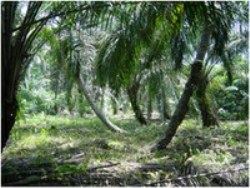The University of Leicester conducted a study into greenhouse gas emissions emitted from oil palm plantations for the International Council on Clean Transportation. The study assessed the greenhouse gas emissions related to the production of biodiesel.
 Oil palm plantations on peat: note the leaning trunks owing to low load-bearing capacity of peat soils
Oil palm plantations on peat: note the leaning trunks owing to low load-bearing capacity of peat soils
The study revealed a 50% higher level in CO2 emissions than what was previously assumed. The researchers reviewed the emissions from oil palm plantations on Southeast Asia’s peatland and also assessed the scientific methods used for deriving the estimates of greenhouse gas emissions. They estimated emissions of 86 t of CO2 per ha/year, a value annualized over 50 years. The previous estimate was 50 t of CO2 per ha/year. If the emissions were assessed over 20 years according to the EU Renewable Energy Directive then the emissions rate would be a higher 106 t of CO2 per ha/year.
Palm oil production on tropical peatland is causing climatic changes, and previous studies have underestimated the emissions. Tropical peatlands are a critical store of soil carbon and an efficient carbon sink for the world. Increase in usage of oil palm plantation area for agriculture is affecting the tropical peatlands, associated biodiversity, the primary rainforest area and endangered species.
When the present estimates are applied to the European biofuel market, it implies that biofuels and petrol are equally carbon intensive. Palm oil biodiesel is causing a rise in emissions from increasing land usage. The study found that bioethanol or biodiesel, when derived from waste cooking oil, can offer carbon savings.
The study will help many organizations, including the European Commission, the US Environmental Protection Agency, the California Air Resources Board, NGOs, economists, scientists and policy advisors to account for the greenhouse gas emissions from biofuel when produced from palm oil.